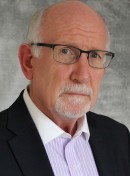Guest Column: Don’t lose sight of the ripples sent forth by terrorism
On March 15, during Friday prayers at two mosques in Christchurch, New Zealand, evil raised its despicable visage in a manner that has become all too familiar.
As worshippers bowed in reverence, gunfire shattered their tranquility. When the shooting stopped, 50 people lay dead, and nearly an equal number were wounded.
Appropriately, individuals and organizations around the the world immediately began denouncing the bigotry, the hate, the depravity that leads otherwise ordinary people to engage in such unbelievably evil acts. But for a moment let’s not focus just on the act of terrorism itself. Rather, let’s consider the far-reaching implications.
It’s not hard to imagine the terror that grips those caught in a sudden hail of bullets. Should they run toward an exit? Should they play dead? Should they try to help those who’ve been wounded? So many potentially lethal decisions that must be made under such terrifying circumstances.
Post traumatic stress disorder (PTSD) is real. The mind may refuse to let go of such memories — which may be re-triggered by the sight of a gun. The sound of a gunshot. A clap of thunder. The flashing lights of emergency vehicles. Sirens. All these images and more may be indelibly stamped on the human psyche, causing the event to be replayed in the mind ad infinitum — even by those who sustained not so much as a scratch.
It’s not complicated for Muslims around the world to connect the dots: If such a travesty can be perpetrated in a place as peaceful and idyllic as New Zealand, it can happen anywhere. So mosques everywhere cease to be symbols of total safety and security.
Other faiths likewise grasp the grim reality: If such things can happen to Muslims in Christchurch; to Jews in Pittsburgh; to Baptists in Sutherland Springs, Texas; to Sikhs in Oak Creek, Wisconsin, then such violence can be directed toward any faith group. Thus their governing bodies begin spending more time focusing on security — time they would prefer to spend addressing spiritual matters and ministering to community needs.
Still others are reminded that the type of animosity directed against religion can be directed toward race, ethnicity, sexual orientation, atheism, political affiliation. Indeed, the ripples of fear go far. There’s the reason it’s called terrorism — because the wanton slaughter of innocent humans does indeed evoke terror.
Unfortunately, terror can be compounding. The more it happens, the greater the fear evoked. And for people who belong to more than one target audience, the fear may be compounded even more. An immigrant of a maligned ethnicity, who is a person of color, who subscribes to a minority faith and who’s gay, may live with intense, unremitting fear. There simply is no safe haven.
But terrorism can also have a deadening effect. Those who don’t view themselves as part of a likely target audience may begin to tune out when such horrors are inflicted. As long as it’s happening to someone else and poses little direct threat to them, they can learn to live with this new normal of wanton violence. After all, they try to tell themselves, the victims must have played some part in provoking the attack.
Others, whose affinity group has directly experienced the horrors of terrorism, may feel justified in paying back in kind.
Whether the deadening of our senses pushes us toward indifference or toward retaliation, we would be well-advised to note the observation of poet and philosopher Alexander Pope (1688-1744): “Vice is a monster of so frightful mien / As to be hated needs but to be seen; / Yet seen too oft, familiar with her face, / We first endure, then pity, then embrace.”
Pope’s words, although written about bad behavior in general, are no less applicable to how we react to terrorism and the mindset that inspires it.
James Coffin is Executive Director of the Interfaith Council of Central Florida.

